
As Eddie Robison once said, “The will to win, the desire to succeed, the urge to reach your full potential…these are the keys that will unlock the door to personal excellence.” This desire to succeed in academics allowed the Ikamvanites to receive Dr Khubeka, a learning development facilitator for the Academic Development Centre at the University of Johannesburg, for a study skills and career guidance talk.
Dr Khubeka has been part of Ikamvayouth family providing study skills and career guidance talks for many years and his involvement has been beneficial to Ikamvanites, playing an important role in transforming the lives of Ikamvanites through his workshops. Ikamvayouth branches always equip learners with the necessary tools needed to survive and career guidance is one of IkamvaYouth programmes that is being implemented at all our 13 branches. This year Dr Khubeka visited the Ebony Park Branch and conducted workshops with learners from grade 9 to 11. Now that the learners are preparing for their midyear examinations Dr Khubeka came at the right time to inspire them with wisdom on how to tackle different examination questions.
Dr Khubeka covered the following topics in his presentation:
? How to take Examinations and Tests
? Types of Examination Questions
? How to analyse an Exam question
? How to prepare for the study Break
? Tips for Exam success
? Time Management and goal setting
? Analyzing an assessment and how to make summaries

Dr Khubeka’s sessions encourages learners to stay calm in exams, and not to panic, also to be around positive people in times of examinations. Furthermore, he inspired learners to be open minded in their studies. Ikamvanites gained practical advice and techniques to use whenever they are in examinations.
The workshop was extremely valuable for the Ikamvanites and I believe that they received more concrete ideas to use in their studies. One of the Grade 11 learners Thato Shumba said, “The workshop energizes and refocuses my passion to excel in my studies, I am happy that I now know how best to answer examination questions from now going forward.”
The workshop was an eye opener to the Ikamvanites since they were fully loaded with different skills to use when dealing with different examination questions. In his closing Remarks Dr Khubeka urged Ikamvanites to do their best and be confident in their exams.
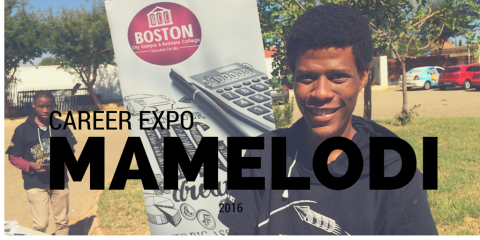

A career expo was held on the 30th of April at the IkamvaYouth Mamelodi branch and we had different exhibitors, some guest speakers and an inspirational MC, Thulani Mphahlele, who delivered a speech which was in the form of an affirmation. He emphasized that “we are created to create, designed to deliver” and we opened our hands in acknowledgment that indeed the future is in our hands.
Guest speaker and senior lecturer at the University of Pretoria, Dr. Craig Grobbler gave a talk about his life, he told us what led him to be where he is now, “If you are born poor it is not your fault, but if you die poor it is your fault.” Challenges will always be there to test how far we are willing to go with perseverance and hard work . What I learned was to never give up on my dreams, don’t prove those who doubt you wrong but prove to yourself that you are right
Some of the exhibitors on the day were ABI, YCAP, Richfield, Boston, and Nedbank. Nedbank taught us that we can actually open bank accounts at the age of 16, these are student accounts and they gave us the opportunity to complete application forms. Boston is college and they offer bursaries to students pursuing commercial subjects. YCAP is a program that offers young people a platform to do projects that they believe can change their communities and help them to live with purpose.
I learned a lot and now I am much wiser about the career I want to follow. Thank you IkamvaYouth for the opportunity and l am looking forward to next career expo.
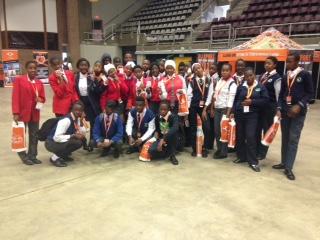
As the great Malcolm X once said “Education is the passport to the future, for tomorrow belongs to those who prepare for it today”. Ikamvanites from greater Midrand region, Ebony and Ivory Park, took a golden step in ensuring that the eventuality will inevitably become reality. IkamvaYouth Midrand branches graced the shores of The University of Johannesburg, Soweto Campus for an informative career guidance expo which was aimed at exposing learners to different courses and career fields to follow.

Ikamvanites in grade 11 and 12 wanted to know and understand what their journey still entails and how to go about reaching their ultimate goals and it was also an opportunity for them to recharge their batteries. What better way to start the proceedings than with an introductory presentation about the culture of the university and challenges that are associated with being a student in the University! One of the main challenges the youth of South Africa are facing is lack of funding. The presentation accentuated on the fact that funding may not be a barrier for high school students if they have good marks. The University advises learners to study hard and follow their passion and they will prevail. Ikamvanites and other peers from different schools and regions had the opportunity to get more information on merit bursaries and sources of funding available to them.


A number of departments exhibited on the day including the Faculty of Humanities, Law, Management, Engineering and Economic and Financial Sciences which gave Ikamvanites a whole lot of information for their benefit. Personal breakthrough observations were made, with a majority of the Ikamvanites becoming certain of their career paths. Tsakani Sambo one of the Ikamvanites said “ The career expo was exactly what I needed, It exposed me to a whole new world and careers I never thought existed, IT business management is what hit deep in my heart”. Experience is the best teacher, consequently in our efforts to continue changing the lives of Ikamvanites it is essential that we expose them to the jungle so as when they go to hunt, it is not a foreign land to them. Aluta continua victoria acerta.
Alex and I have been attending the Education NGO Leadership Summit in Benoni today, hosted by the National Education Collaboration Trust (NECT).
Godwin Khosa (NECT’s CEO) explained the reasons behind NECT’s focus on interventions at the district level; he said that ultimately, we need to focus on interventions that hold potential for changing the system as a whole. Hence, they are not focusing on the level of the learner, or at that of the school. He said that while NECT could hold Saturday classes and see increased improvement in Maths and Science, these initiatives take a lot of effort, are not systemic, and have a lower sustainability potential.
And I agree with him, in that it’s clear that the system needs an overhaul, with the functionality of schools, districts and provinces increasing dramatically. However, I’m really concerned about the idea that working at the “learner level” is seen as too much effort, unsustainable, and not systemic.
We all know that the learners currently enrolled in the system are in dire need of remedial support to overcome the deficits in their grasp of the basic fundamentals, especially with regard to literacy and numeracy. 27% of our grade 6 learners are functionally illiterate (SACMEQ, 2007), grade 9s scored an average 14% in Maths in the ANAs (2014), and only 3% scored more than 50%. In 2015, the matric pass rate was 71%, but due to heavy grade dropouts, the cohort pass rate was actually just 41%.
Khosa outlined the achievements of NECT to date. While there were some references to “evidence of improvement in the organisation of schools,” the achievements were primarily limited to a list of outputs (number of principals and HODs trained, number of resource packs availed, flash cards, management trackers, etc.) rather than outcomes. Now, while Khosa is absolutely correct that expecting to see improved learner outcomes from NECT in this early stage of its operations (just two years), I am unconvinced that this approach is sufficient for ensuring that 90% of learners pass Maths, Science and Language at above 50% level by 2030 (NECT’s very important and compelling overall objective).
As I outlined in the interview with Business Day a few weeks ago, learners’ gaps in understanding and comprehension, particularly when it comes to STEM and language subjects, require individual attention and personalized learning experiences. And while ICT provides some opportunity for offering personalised and responsive learning experiences at scale, all ed-tech people will tell you, the tech is only ever going to be a small part of what it takes to improve learner achievement.
Learners need relationships, with people who give them time, who build their trust, who help them to figure out where their gaps and challenges are, and then provide them with the academic and psycho-social support they need to dramatically improve their results and confidence. In some homes (mostly in middle class homes), parents and caregivers have the education and time to do this. Most middle class families also enroll children in after-school tutoring programmes.
Unfortunately, this additional support is unavailable to the majority of our country’s learners. It is unrealistic to expect that the education system can provide this level of individualized support to learners, especially when we consider the psycho-social challenges that learners in the lowest quintiles are up against. But the view that doing so is too difficult will ensure the perpetuation of our learners’ dismal academic performance. How can we produce outcomes at the learner level, without working with learners?
Lynn van der Elst, from Miet, said that we need to better understand Government, to put ourselves in their shoes and try understand why things work the way they do. And I think that this important point speaks to the impetus behind NECT’s decision to focus at the district level and above, as levers that make sense for systemic interventions. Government’s job is to serve the 12 million learners who are supposed to be enrolled in the system. Just providing learning materials to 12 million learners must be a colossal challenge, and so it’s unsurprising that the provision of textbooks and digital learning resources is hailed as a systemic intervention, despite the lack of empirical evidence that this will lead to improved academic achievement.
Speakers also spoke about the role of NGOs as innovators, and called for increased collaboration and stronger networks of support. The National Development Plan highlights active citizenry as one of its core pillars, and most of the speakers identified the promotion and creation of active citizenry as a key role for civil society. It is these active citizens that can step up and provide the intense level of support and care that learners need, so that we can see the kinds of radical shifts in academic achievement so desperately needed.
IkamvaYouth’s volunteer tutors and mentors are evidence of what’s possible when citizens become active. Most of these volunteers are university students, and many used to be learners in the programme themselves. By consistently showing up to meet learners where they’re at, they effectively assist learners to dramatically improve their academic results, and go on to access tertiary education, learnerships or jobs. We’re working with almost 20 other tutoring and mentoring programmes, towards achieving collective impact, and together, we will be reaching 3000 learners this year.
Deputy Minister Mr Enver Surty challenged us about the tiny size of our interventions, and encouraged us to think big. “How do we take the principles and vision of the NDP into practical reality?” There were many NGOs in the room who are indeed promoting, inculcating and coordinating active citizens. NGOs like Enke, Fundza, TEACH South Africa, Room to Read, WESSA, Partners for Possibility, Equal Education, Bridge, Section 27 and Breadline Africa. NGOs who are inspiring, recruiting, equipping and coordinating active citizens to roll up their sleeves and get involved in educating learners, providing a pipeline of educators, supporting principals, improving schools, challenging policymakers, and ultimately working towards the NDP’s big goals. While many are working together already, there is always room to better leverage the potential of collaboration. And it is only through collaboration that we’ll be able to operate at the scale that makes sense to Government.
The meeting began with a screening of Thandi’s story, which so smartly illustrates the challenges that the NDP aims to address and overcome. When Trevor Manual spoke at IkamvaYouth’s ten year birthday bash, we screened Funeka’s story, to illustrate the impact that after-school tutoring and career guidance mentoring can have. A meaningful way to contribute towards the NDP’s implementation for civil society is to mobilise and activate citizens, and to coordinate our efforts, with each other, and with Government, so that together we can reach more learners like Thandi and enable them to leverage education and improve their lives, just like Funeka.
We appreciate NECT’s efforts to bring us together, and are looking forward to future engagements. Thank you for this opportunity, which we hope is just the beginning of a more cohesive and collaborative approach to realising the NDP.
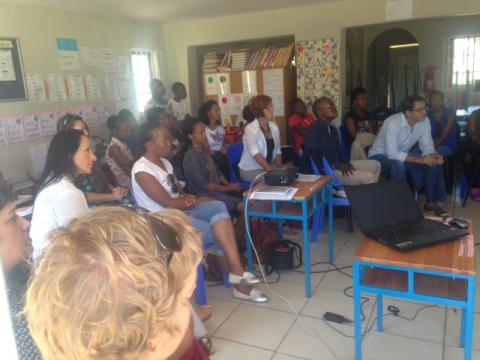
Moving from one place to a desired place entails beginning with an end in mind. A wise man once said “It’s very hard to be successful without having a good mentor, it is essential to have someone you can look up to and emulate. Also, a mentor will show you the tricks and pitfalls of the game because they have likely already been around the block.” – Varun Gulati

On this day, 5th of March, IkamvaYouth Ebony Park branch together with Comensa held its mentorship workshop. As part of the five IkamvaYouth programs, Mentoring has been a crucial element in achieving IkamvaYouth goals and Mission. Gauteng Ikamvanites in grade 12 and 11 had the opportunity to network with professionals from different organization where mentoring was the main objective of the day.
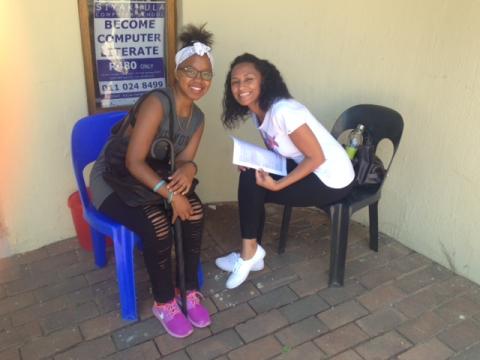
On the day, mentors/coaches were given time to introduce themselves and tell Ikamvanites what they bring to the table and how it can beneficial in the long run. The Kolb Learning cycle was used as an example to learners so that they can better understand what role the mentor plays in the mentorship relationship. Ikamvanites participated in a session where expectations and roles were dealt with. Amongst the roles discussed was that a mentor is a facilitator, advisor, source of information, and amongst other things, a networker. Ikamvanites were urged to take charge and drive the agenda.
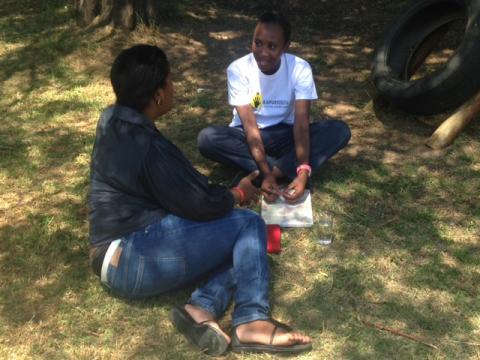
As it was said before, IkamvaYouth enables learners to make a transition from one current state to another state through mentoring and its other programmes. Through mentoring IkamvaYouth is hoping to Increase high school graduation rates; lower the high school dropout rates, encourage healthier relationships and lifestyle choices; create better attitudes towards school; increase University/college enrolment rates and educational aspirations; enhance self-esteem and self-confidence; improve behaviour both at home and at school; strengthen relationships with parents, teachers, and peers; improve interpersonal skills for learners and decrease the likelihood of drug and alcohol abuse.
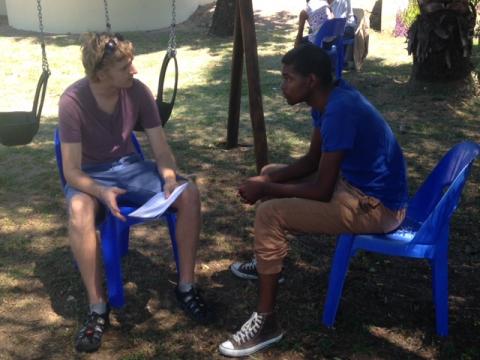
As they say “It takes a village to raise a child” and Ikamvayouth is challenging you to join its mentoring program and help a child realise that their dreams are possible.
Their future is in their hands!!
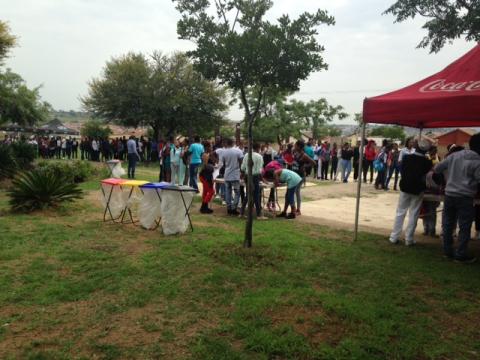
Martin Luther King Jnr once said “life’s most persistent and urgent question is, what are you doing for others?”. On Saturday the 23rd of January 2016, the IkamvaYouth Ebony Park branch hosted it’s annual open day to kick start 2016,welcome parents, learners, volunteer, sponsor(ABI),mentors and further strengthen our brand presence in the Midrand.

Our MC, Mr Welshman Dube launched the day with a prayer,followed by an ice breaker to get everyone settled and later presented the “Funeka’s Story” which outlines how Ikamvayouth continues to assists high school learners with their academics.
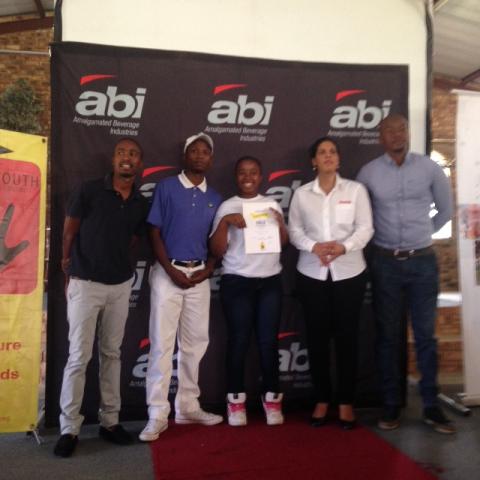
Sarika Kisten from ABI explained how proud they are to partner with IkamvaYouth as it uplifts the youth of South Africa through education.Tzu Chi, gave a well-received testimony on education, community involvement and the activities that the Tzu Chi Foundation are involved in.
Percy Mabizela, one of our tutors, gave a motivational talk that focused on important life lessons the youth need to learn and apply from the beginning of the year. In his words “Self-awareness is about knowing your talent, your dreams, strengths and weaknesses.” He emphasised that once people know what they want to become in life, they must make decisions and choices that will bring about positive results.
In addition, two of our current Grade 11 Ikamvanites , Meyahabo Rapholo and Njabulo Mutle recited poems that outlined the importance of education and emphasized it’s benefits.
Kefilwe Maake who join IkamvaYouth in 2014 and obtained 5 distinctions,explained how Ikamvayouth assisted her to achieve these distinctions. Kefilwe extended her gratitude to ABI for the the financial and non-financial assistance the branch continues receive.
“Through with hard work and commitment it is very easy to excel in academics” – Kefilwe Maake
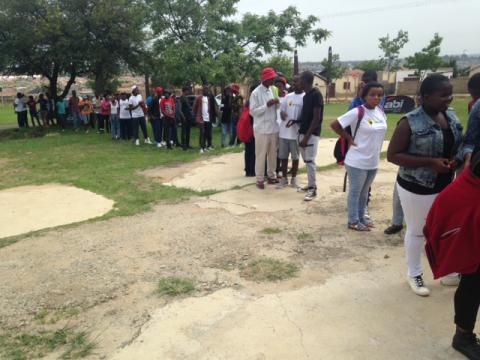
IkamvaYouth awarded learners for their commitment and dedication shown towards their studies. Ikamvanites were awarded for achieving 80% and above for attendance and received certificates for participation in Operation Fikelela through Siyakhula Computer School. Awards for the “learner of the Year”, “most improved learner” and certificates of participation were handed to the deserving learners and ABI further praised the learners who obtained distinctions for their respective subjects. At the end of the ceremony, all IkamvaYouth learners received gifts from IkamvaYouth and backpacks from ABI, to thank them for being part of this educational movement.
2016 has kicked off with a BANG and is set for producing more excellent results.
Ikamva Youth: The future is in our hands.















 Lloyd Lungu
Lloyd Lungu